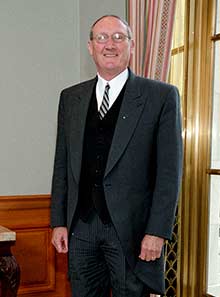Supreme Court clerk retires ... again

“General Suter had the respect and ultimately the affection of every law clerk in the building,” says David Meyer, dean of the Tulane Law School, who clerked for Justice Byron White. (Photo from the Collection of the Supreme Court of the United States)
Each end of term since then has kept the 1962 Tulane Law School graduate just as busy. But his job running the Clerk's office actually is a year-round challenge: processing thousands of petitions for review annually; maintaining the docket; and guiding lawyers through the very precise procedures for presenting their cases to the justices.
After 22 years, Suter, 75, is retiring at the end of August. June 26 was his last day to take his place in the grand courtroom for the announcement of opinions.
The justices closed out the term with two momentous rulings that moved forward the cause of same-sex marriage.
But the last order of business was for Chief Justice John Roberts to thank the retired Army general who was making his second retirement, this time as clerk of the court.
Suter “has sat next to the bench for the past 22 years and has heard more than 1,700 arguments,” Roberts said. “General Suter had a distinguished military career before coming to the court, and he will retire from this position with more than 51 years of government service.”
Suter started at the Supreme Court Feb. 1, 1991, after a celebrated career with the U.S. Army in which he rose to the rank of major general and led the Judge Advocate staff.
He called it an honor to work at the Supreme Court, “a place where we settle disputes peacefully, rather than in the streets.”
Linda P. Campbell is director of communications for the Tulane Law School.
